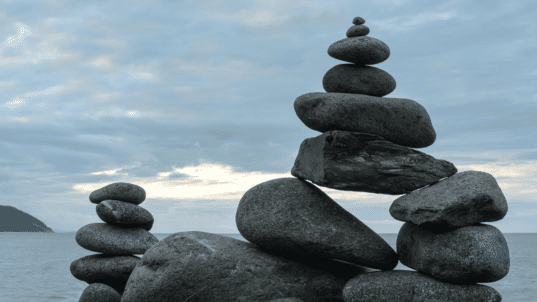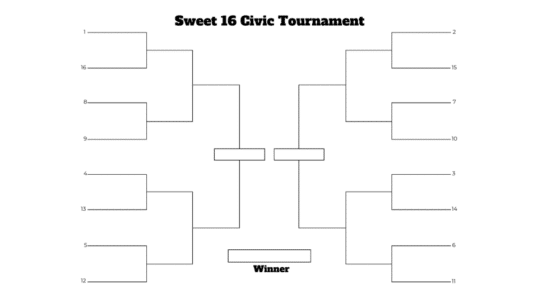Forgive me my nod to Austin Powers (and Inspector Clouseau before him), but I realize you might find yourself wondering just what is it that we do in the Interactivity Foundation (IF). The Summer Institute will focus on exploring connections between what we do in the Interactivity Foundation and what you might do in your classrooms (and beyond). So here’s a quick overview of what we do.
Our central thrust is to foster deliberative discussions to help people think of “more”—more aspects of complex social issues and more (and divergent) ways to respond to these. To do this, we’ve developed an approach to discussions that is designed to help people collaborate with each other in the discovery of “more.” It’s designed to help people engage with each other in a way that helps them see more aspects of these social concerns, to discover their interconnections, and to develop contrasting ways that we, as a society, might address them. We’ve focused this central thrust into 3 highly interconnected areas: Sanctuary Projects, Citizen Discussions, and Education. Our work with you on the Summer Institute is obviously part of our Educational focus, but these are all interconnected. Here’s a brief summary.
- Sanctuary Projects
Our Sanctuary Projects are long-term citizen discussion projects that focus on a complex area of social and political concern. We focus on topics that are big—big enough to require lots of minds thinking together and too big for any one area of expertise to claim to have all the answers. We want people to be able to explore the interrelationships between different aspects of these topics. We’ve done Sanctuary Projects on Privacy, Depression, Human Genetic Technologies, Rewarding Work, Science, Regulation, Property, and Public Discourse, and we’re starting projects on the Future of Civil Rights, Global Security, Democracy Promotion, and Shaping Where We Live.
These projects run for about a year of monthly discussion meetings, where each meeting might run for several hours. We use two panels of citizens, one where the panelists might have some particular expertise relevant to an aspect of the topic (a “Specialist Panel”), and one where the members are just citizens interested in talking and thinking together (a “Generalist Panel”). The two panels work independently until the end of the process.
The project discussions proceed organically in a trajectory of: exploring the different basic questions that we as a society might ask about these complex topics, exploring different possible ways society might respond to those questions, and then exploring what the consequences might be for those different possible approaches (this, in turn, leads to some revision and consolidation of those approaches). That’s a nutshell description of what we’d call our “Sanctuary Discussion Process” (in the future I’ll go into a bit more detail about some of the key aspects of this discussion process). The thinking of the panels is captured by the IF Fellow who facilitates the project in a discussion report. The report briefly presents some of the different aspects of the area of social concern and some of the contrasting approaches that society might take toward them. Our goal is to emerge from these yearlong discussions with a group of contrasting approaches, or policy possibilities, that would be useful for stimulating further exploratory discussions among other citizens. This brings us to our next focal area:
- Small Group Citizen Discussions
These are short-term citizen discussion series where a group of 6-8 meet for 3 or 4 sessions to discuss the ideas developed during a Sanctuary Project. We think of our Sanctuary Projects as doing the groundwork to help other citizens get into their own explorations of complex topics of social and political concern. Our basic thrust is still the same, to help people think of more, and more divergent, possibilities than they otherwise might. We’re not trying to sell anyone on a particular policy idea or a particular approach that we might take to a given issue. We see these events as a chance for citizens to develop and expand their own thinking about these complex topics by using the ideas developed during our Sanctuary Projects as springboards for their own exploratory discussions. As we mentioned during our recruitment for the Summer Institute, we’d like to involve you in conducting at least one such Citizen Discussion (although all our discussions involve “citizens,” we tend to refer to these short-term sessions as our “Citizen Discussions”). Not only will this help you better understand the work we do, and the kind of thinking we foster, in our Sanctuary Projects, but it may also help you discover both connections to the classroom and ways to connect your classroom (or academic life) to your surrounding communities.
- Education
This focus area is a bit more obvious, since it has drawn us together for the Summer Institute. The background story is that once we had our Sanctuary Projects up and running, we started to think about how this approach to collaborative and exploratory discussions could be relevant to the classroom. We’re interested in the ways that this could transform teaching to encourage more collegial and interactive discussions across disciplinary boundaries. And we’re especially interested in the ways that students’ learning could be transformed by teaching them to be facilitators of such collaborative and exploratory discussions in what we’d call student-centered discussion courses (more about this in future postings).
In the Summer Institute we’ll bring to bear these 3 different focal areas. To help you make these connections to the classroom, we’ll engage you directly in discussions along the lines of what we do in our Sanctuary Projects. You’ll experience what it’s like to be a participant in this kind of discussion—and what it’s like to facilitate this kind of discussion. You’ll also experience our Citizen Discussions in the same way. From these experiences we’ll work together to build up your ideas for your own courses using this approach.
I’ll tell you more about the program for the Summer Institute in the future. In the meantime, as you think about the Educational aspect of what we do, you might like to read this NY Times op-ed piece, “End the University as We Know It,” from Mark Taylor at Columbia (you might need to register with the NYT site to read the article). Much of what he talks about in terms of restructuring the curriculum of higher education by fostering cross-disciplinary collaboration and by fostering a new generation of skills connects well with our approach. You might think about how we can best prepare our students for a future we can only barely conceive.
–Jeff Prudhomme



